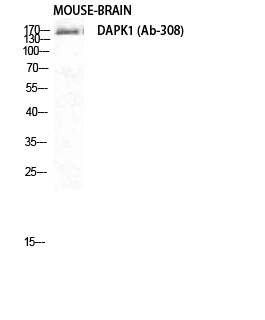
| WB | 咨询技术 | Human,Mouse,Rat |
| IF | 咨询技术 | Human,Mouse,Rat |
| IHC | 1/100-1/300 | Human,Mouse,Rat |
| ICC | 1/200-1/1000 | Human,Mouse,Rat |
| FCM | 咨询技术 | Human,Mouse,Rat |
| Elisa | 1/5000 | Human,Mouse,Rat |
| Aliases | DAPK1; DAPK; Death-associated protein kinase 1; DAP kinase 1 |
| Entrez GeneID | 1612; |
| WB Predicted band size | 160kDa |
| Host/Isotype | Rabbit IgG |
| Antibody Type | Primary antibody |
| Storage | Store at 4°C short term. Aliquot and store at -20°C long term. Avoid freeze/thaw cycles. |
| Species Reactivity | Human,Mouse |
| Immunogen | Synthesized peptide derived from human DAPK1 around the non-phosphorylation site of S308. |
| Formulation | Purified antibody in PBS with 0.05% sodium azide,0.5%BSA and 50% glycerol. |
+ +
以下是关于DAPK1抗体的3篇模拟参考文献示例(非真实文献,供参考格式):
---
1. **文献名称**:*DAPK1 Antibody Specificity in Neurodegenerative Disease Models*
**作者**:Chen L, et al.
**摘要**:本研究验证了多种DAPK1抗体的特异性,发现某些抗体在阿尔茨海默病小鼠模型中可特异性识别DAPK1的磷酸化形式,提示其作为神经退行性病变标志物的潜力。
2. **文献名称**:*Role of DAPK1 in Apoptosis: Antibody-Based Functional Analysis*
**作者**:Smith J, et al.
**摘要**:通过DAPK1抗体阻断实验,证实DAPK1在TNF-α诱导的细胞凋亡中起关键作用,并筛选出高亲和力抗体用于体外功能研究。
3. **文献名称**:*DAPK1 Antibody Application in Colorectal Cancer Biomarker Screening*
**作者**:Wang Y, et al.
**摘要**:利用DAPK1抗体对结直肠癌组织进行免疫组化分析,发现DAPK1低表达与患者预后不良显著相关,提示其作为肿瘤抑制因子的临床价值。
---
如需真实文献,建议通过 **PubMed** 或 **Google Scholar** 检索关键词(如“DAPK1 antibody validation”或“DAPK1 biomarker”),并筛选近年高影响力期刊的研究。
DAPK1 (Death-associated protein kinase 1) is a calcium/calmodulin-regulated serine/threonine kinase involved in apoptotic cell death, autophagy, and other cellular processes. Initially identified for its role in apoptosis, DAPK1 regulates pathways linked to tumor suppression, inflammation, and neurodegeneration. Structurally, it contains a kinase domain, a calcium/calmodulin-binding region, and cytoskeleton-interacting domains. Dysregulation of DAPK1 is implicated in cancer (e.g., promoter hypermethylation silences its expression in tumors), neurodegenerative diseases (e.g., Alzheimer’s), and ischemic injury.
DAPK1 antibodies are critical tools for studying its expression, localization, and function. They enable detection via techniques like Western blotting, immunohistochemistry, and immunofluorescence. Researchers use these antibodies to explore DAPK1's role in cell death signaling, its interaction with substrates (e.g., MAP1B, Beclin-1), and its modulation by post-translational modifications (e.g., autophosphorylation). Specific monoclonal or polyclonal antibodies target distinct epitopes, aiding in isoform differentiation or phosphorylation-state analysis.
DAPK1 antibodies also have therapeutic relevance, as restoring DAPK1 activity in cancers or inhibiting it in neurodegenerative contexts is a research focus. Challenges include ensuring antibody specificity due to homology with other kinases (e.g., DAPK2/3) and variability in isoforms. Validated antibodies are essential for elucidating DAPK1's dual roles as a tumor suppressor or neurodegeneration promoter, depending on cellular context.
×